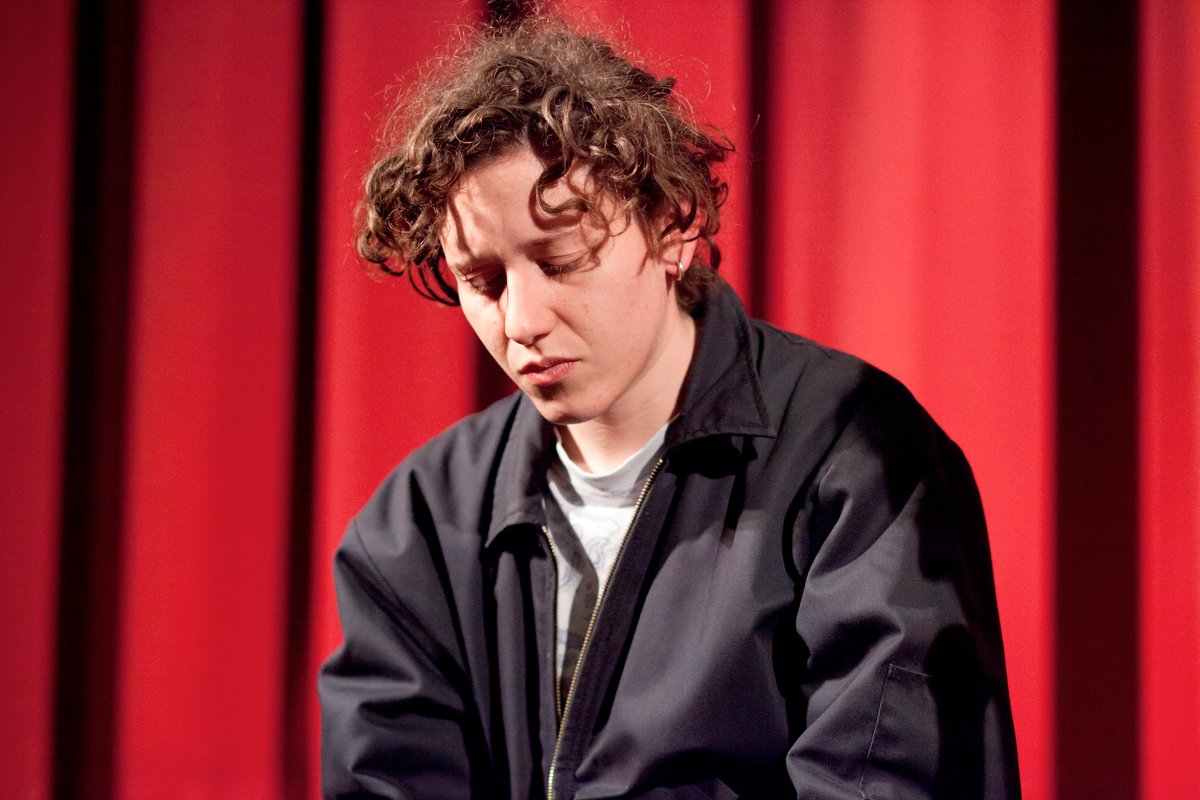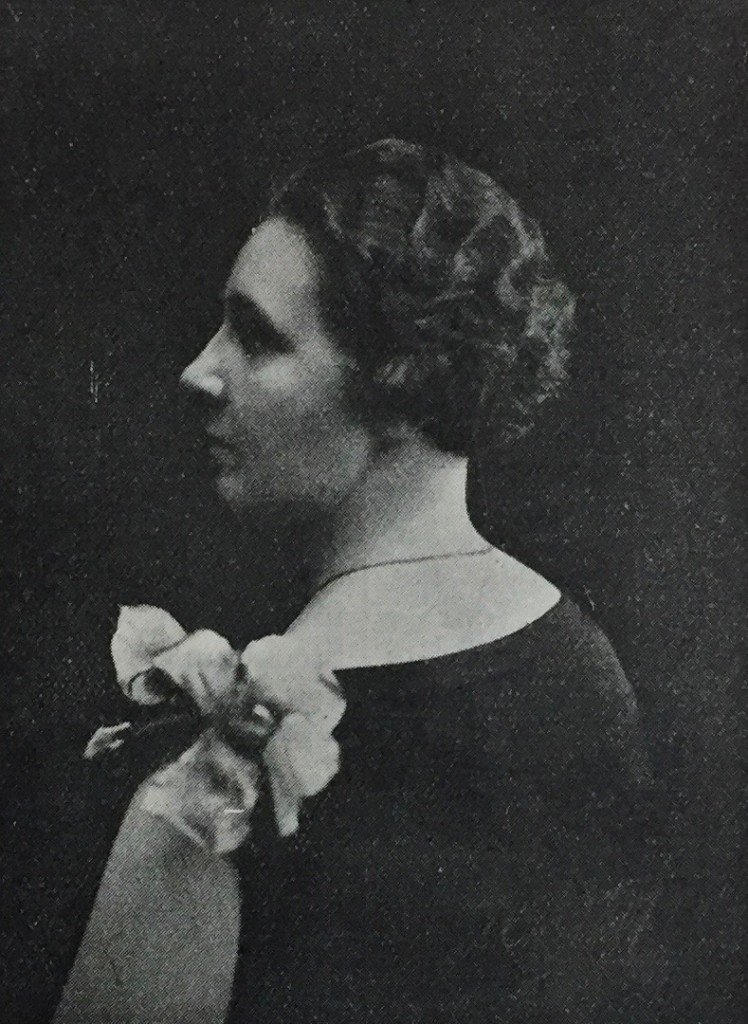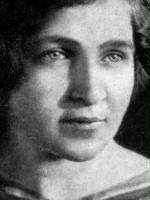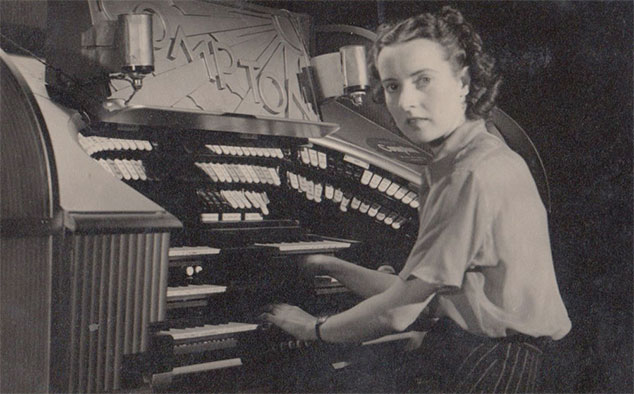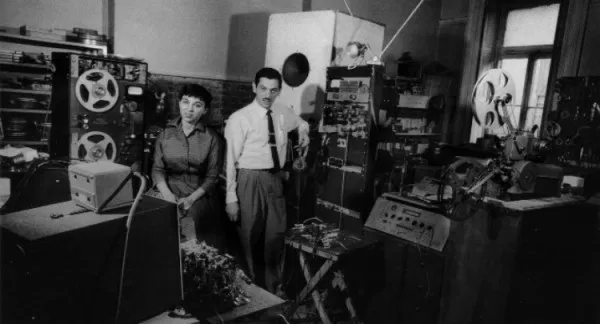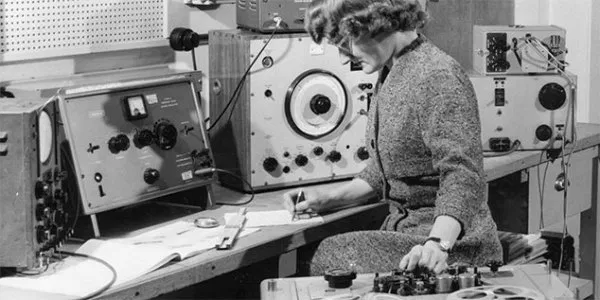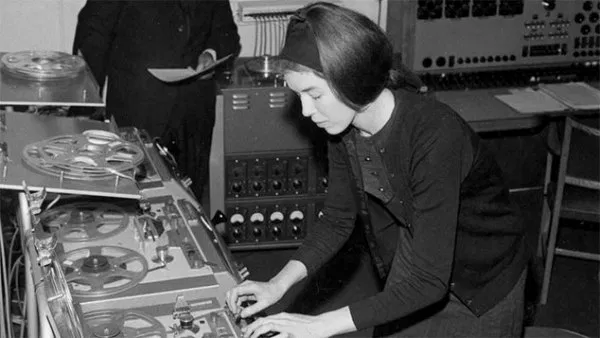Last year I wrote an article about the women who created the sound of science fiction. It was in Spanish, which I guess that most of you don& #39;t understand, so I& #39;m gonna write a thread about this.
First a bit of context. In film history books it& #39;s quite rare to find women& #39;s names, unless we are talking about actresses. However, even in the first days of cinema, there were female directors, producers, screenwriters, camera operators... And also, of course, female composers.
Lately, the mainstream press has begun to mention some female film composers, such as Mica Levi (Under the Skin, Jackie...) and Hildur Guðnadóttir (Chernobyl, Joker...). Sometimes they talk about them as if they were the first women to have done that.
When cinema was invented, films weren& #39;t silent. Usually, at all screenings, there was at least one musician playing live, the most common instruments for those soundtracks were piano and organ. Among the musicians who made a living doing that work, there were many women.
Some of those female pioneers played pieces by other musicians, others, such as Alice Smythe Jay, composed soundtracks and even developed methods for synchronizing image and sound. She also made recordings for this device—orchestrion—, which was used to play soundtracks.
This wasn& #39;t something that happened only in the USA. In Europe, a lot of female musicians made a living playing for films. Some names: Greta Håkansson (Sweeden), Nina Agadzhanova-Shutko (Russia), and Louise Macdonald (Ireland). Some of them did a lot of things beyond that.
These women played music for all kinds of films: period dramas, fantasy, science fiction, horror… In general, the music was classical or traditional. The sound of science fiction, which is the subject here, comes later, in the 50s.
The first electronic soundtrack ever made for a film—or at least the first that we know of—was the one made for Forbidden Planet. That soundtrack was created by a couple: Bebe and Louis Barron.
Bebe had studied music at the University of Minnesota. She later moved to New York to continue her studies, where she also worked for a record company. At that time, she married Louis, who was also a musician.
Bebe had a background in political science and Louis had worked with electronic material, so they knew a lot of things that were not related to music. When they got married, a cousin of Louis& #39; gave them a German cassette recorder. Such recorders didn& #39;t exist yet in the USA.
Bebe and Louis had devices that no one else had at that time, so contemporary composers as well known as John Cage and Edgard Varèse were able to create some of their first electronic pieces thanks to Bebe and Louis.
Bebe would record, cut, and paste tapes to generate strange sounds. Both she and her husband were interested in social systems and technology and they began researching cybernetics. That was their inspiration to build electronic sound circuits based on mathematical equations.
Musicians of their time considered that what they did was not music, so Bebe and Louis were more connected to the contemporary art scene. That& #39;s what led them to make music for films by artists like Ian Hugo. https://youtu.be/HE-7qEftad8 ">https://youtu.be/HE-7qEfta...
Usually, Louis generated and recorded sounds and Bebe was the one who reviewed, selected, and organized those sound into compositions. It& #39;s said that Bebe was the first person ever to create a tape loop.
Those experiments caught the attention of MGM, which was looking for strange sound effects for Forbidden Planet. The music was going to be created by someone else, but the studio was so fascinated by the Barrons that in the end they were commissioned to do all the work.
It was not an easy job, they had some clashes, especially with the head of the music department, because what they were doing was too weird for that time, the 50s. https://youtu.be/IyGwe1cfQko ">https://youtu.be/IyGwe1cfQ...
The credit at the beginning of the film was supposed to be "Electronic Music by Louis and Bebe Barron", but the American Federation of Musicians told them that what they do was not music and forced them to change it to "Electronic Tonalities".
The musicians& #39; union refused to admit the Barrons and that denied them the possibility of competing for awards like the Oscars.
Luckily, the audience loved their music. When the film was screened for the first time, the sound was synchronized directly from the tapes and was louder than usual for the time. It was also in stereo, which was very rare in the theatres of the 1950s.
Bebe herself explains that viewers were so excited that they applauded every sound effect. Despite the success, because of the problem with the musicians& #39; union, the Barrons never worked for a commercial film again.
Daphne Oram grew up in a small English village. During her childhood and adolescence, she learnt piano and composition, but she also helped her brother to build radio transmitters and receivers. So, another woman who knew music and technology.
When she was 17 years old, she was offered a place at the Royal College of Music, a prestigious institution that didn& #39;t accept many students. She turned it down because she wanted to work as a sound engineer for the BBC. She was interested in machines, not traditional music.
At the BBC, she started using oscilloscopes and other electronic devices that were not within the reach of most musicians. During a professional visit to the RTF (the French public broadcaster), Daphne met Pierre Schaeffer, the father of concrete music.
Then she began experimenting with cassette tapes. She focused on creating electronic music using tape recorders, mixers, oscillators, and her own synthesizer, the Oramics. https://youtu.be/JBgHkpPey8k ">https://youtu.be/JBgHkpPey...
Those sounds were quite shocking for the listeners of the 1940s. She created music and sound effects for films, television, and radio. She worked for all kinds of films: James Bond, horror films such as Suspense (1961)…
Usually, her name isn& #39;t mentioned in the credits of the films because she was not the & #39;composer& #39; of the musical pieces, she generated weird sounds for the music, and also for the sound effects.
She created sounds for science fiction and fantasy TV shows and also for radio theatre. The best-known example is the series Quatermass and the Pit (1958-59), in which Dr. Quatermass finds an alien ship of evil influence.
Daphne never composed a complete soundtrack for a science fiction film, but her research and creative work is one of the fundamental bases of the sound of today& #39;s genre cinema. https://youtu.be/q8xy5ieJDaM ">https://youtu.be/q8xy5ieJD...
Delia studied, like Daphne, piano since she was a child. However, unlike Daphne, her obsession with non-musical sounds had nothing to do with radio transmitters. She lived in an area where it was common to hear alarm sirens, so she grew up fascinated by the sounds of WWII.
In college, she graduated in music and mathematics. Like Bebe and Delia, she was interested in both art and science. She wanted to be a sound engineer, not a pianist, which would have been the easier choice in the 1950s.
When she graduated, her goal was to get a job at Decca Records& #39;, but she was told that they didn& #39;t hire women. To survive, she spent some months teaching music and maths and working on music promotion.
In the 60s she managed to get a job in the BBC, where she found out about the BBC Radiophonic Workshop and asked to work there. The BBC Radiophonic Workshop was one of the first television departments dedicated to sound effects. Daphne Oram was one of the founders.
Delia was fascinated by machines and technology, but also by the sounds of everyday life. She recorded sounds from nature and from the urban and domestic environment and then she manipulated them to get strange effects. This may sound common, but in the 50/60s it was quite rare.
She worked mainly for television, short films, documentaries, and radio. Here you can see Delia explaining some of her techniques. https://youtu.be/puzHEbL4-xs ">https://youtu.be/puzHEbL4-...
The most famous soundtrack in the history of science fiction TV wouldn& #39;t have existed without her. I& #39;m talking, obviously, about Doctor Who. The score was by Ron Grainer, an Australian composer who worked for the BBC, but it was Delia who created the soundtrack.
Ron wrote the basic notes on one page and sent it from Portugal, where he lived, leaving all the work to the BBC Radiophonic Workshop. Delia received the assignment with enthusiasm because the score was just a draft and that gave her the freedom to create whatever she wanted.
She used oscillators and a tape recorder, she cut and pasted sounds on cassette tapes. She also used various effects, such as slowdowns, and the rest is history...
Ron Grainer was so shocked when he first heard the track that he asked the BBC to put both their names in the credits, because he hadn& #39;t done much. The BBC refused because of internal policy issues about how composers should be included in the credits. https://youtu.be/75V4ClJZME4 ">https://youtu.be/75V4ClJZM...
In the 60s, when Delia was still working at the BBC, she founded Unit Delta Plus, a group dedicated to both creating electronic music and promoting it. They recorded songs and played in some electronic and experimental music festivals.
From the 70s onwards, their life sank into chaos because she was an alcoholic. Although she never stopped making music, between the 70s and 2000s she published almost nothing.
In 2001, she returned to the public sphere, but she was heavily consumed by alcoholism and died that same year due to kidney failure.
Her legacy is not only important to science fiction and television, some well-known electronic musicians, including Aphex Twin, Chemical Brothers, and Orbital, often cite her as one of their greatest influences.
Without Bebe, Daphne, and Delia, the sound of science fiction would be very different. Still, it& #39;s rare to see their names in books about film, or even film music. They are relatively well-known in the electronic music field, but film history seems to have forgotten about them.
Maybe it& #39;s not just because they are women, most of the time a classical orchestral soundtrack is taken more seriously than an electronic one. And I& #39;m gonna end this saying that I hate classical orchestral soundtracks.
By the way, the original article that I wrote in Spanish is here: https://www.caninomag.es/las-mujeres-que-crearon-el-sonido-de-la-ciencia-ficcion/">https://www.caninomag.es/las-mujer...

 Read on Twitter
Read on Twitter
